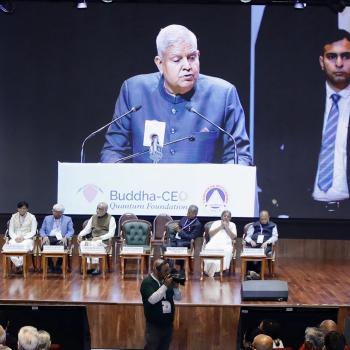What we should remind ourselves is that the environmental crisis is a human crisis and that it stems directly from the wrong relationships we hold with God, and one another and other creatures vis-à-vis God's Divine Law. Shirk, associating anyone with the divinity of God, is equivalent to oppression as the one who rejects his own origins, nature, and truth is only oppressing his own soul. Hence, we are left with an obvious question: How can goodness emanate out of one who is oppressed by his or her own hands?
Here are four practical, personal actions we can all take to ultimately change our conditions and that of our community and environment.
1. Cultivate Self-Awareness. We must start at the beginning within the sphere of our control, personal and family activism, following the wisdom of the Prophet, sallallahu alayhe wa sallam, who was commanded to begin with himself and then his family. The gist of it is that we must become aware of our bodies and be present in the moment, which requires practice, for this is how we learn self-control and how we can develop quiet introspection so as reconnect to our inner voice. Scoff not at this as some hippie-dippie prescription. Rather, cultivating self-awareness brings us down to intention, and that is truly where the environment, and its rescue, begins, inside us.
2. Re-Embrace Our Children. So instead of giving our children up to be raised by a "system," we must embrace them fully with all its challenges and hardships. This is necessary for both our spiritual development and because every new generation represents hope for a new opportunity for change. We must allow them the opportunity and freedom to be whom they choose out of their own experiences and the call of their hearts under the guidance of Islam, trusting in the watchful Eyes of Allah. This is far better than our current fashion of imposing on them our shallow expectations of prestigious careers and fears of social rejection. I am not talking about choosing between a "useless" liberal arts degree and "get-rich" medical school. I am talking about expanding our horizons to see the moral integrity of creating the things we use, cultivating land, and investing in real connections with each other beyond socializing, by which I mean the glue of lush economic connections. Expanding our children's horizons will allow them to think in ways we have been unable to (or don't want to) break through to. They may well be the ones to live the life we are unable (or don't want) to live. Maybe they will understand and implement the Islamic imperative to take what is good and leave what is bad.
3. Reconnect with Creation. Another essential ingredient is to reconnect with "nature" so as to develop in our children (and maybe ourselves) a natural "bodily" reverence for life that many of us are only able to intellectualize. But this must be guided by sound belief in the Oneness of God, and by inculcating them with the principles of the Qur'an and the prophetic way of His Messenger. For if we conserve no befitting servitude to God, we shall preserve no wholesome care for His creation. The two are inseparable, our observing the rights of God and the rights of God's handiwork, the environment. Put another way, if we behold not the beauty of God, we shall hold not the beauty of the creation He fashioned for us and all "others." Or we may say that God is the Truth who created all things with the truth. To violate His Truth with falsehood is to necessarily corrupt creation.
We can nurture our children's connection to nature by giving them the toys of creation instead of planting consumerism's seeds in them from birth. Have them spend a significant amount of time outdoors playing with mud, sticks, trees, water, and animals, and keep them away from media. We must cultivate in our children a love for work, such as making things by hand. This can also be integrated into a curriculum and at home. It is a great deficiency and point of criticism that we Muslims have come to see ourselves "above" the labor of self-sufficiency, valuing instead desk servitude, jobs that may give the delusion of social prestige but contribute nothing to our communal wellbeing.
4. Reconnect Our Education with Life, Namely, the Qur'an. Our education has to be reconnected to life. Our learning must become contextualized so that we move from learning "facts" to critically understanding the world we live in and being able to function in the world with wisdom and integrity. That is to say, we must address the needs that come with our life as spiritual beings not fully of this earth. Humans are always looking for upliftment, for a high, for power and control to give them purpose and meaning. Even though we kill our hearts from a young age, we are driven for a need to "feel," which comes from our increasingly adrenalin-driven activities and furious search for wealth and worldly status. What we are really searching for is transcendence, truth, spiritual fulfillment.




